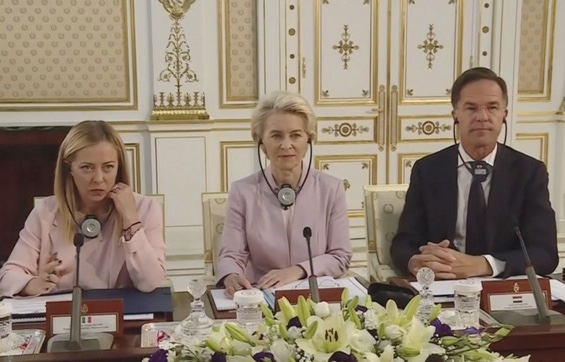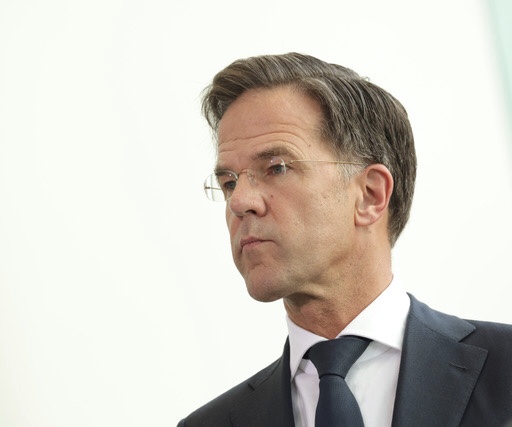The coalition government in the Netherlands, which took office in January 2022 after a collapse of the previous government a year earlier, has now once again collapsed. This time, the government has stalled due to disagreements over the Prime Minister’s plans to deal with migration flows into the Netherlands.
The decision by the Dutch Prime Minister, Mark Rutte, to resign on Friday 7th July and to trigger new elections, came as the parties in his coalition government failed to agree on proposed tighter measures to limit the number of migrants entering Holland. At the heart of the disagreement was a measure being proposed which would limit the ability of family members to join refugees who had already successfully entered Dutch territory, a so-called reunification rule. Mark Rutte’s right of centre conservative party, the VVP, were hoping to secure agreement on a two tier system where individuals who were fleeing persecution enjoyed more rights then those fleeing conflict zones. The Christian Union Party (one of four members of the coalition) in particular, stood firmly at odds with the proposed new regulations, stating that they could not be party to a program that resulted in the breaking up of families.
At a press conference the Dutch Prime Minister announced his plans to visit the King, and he explained his decision to resign:
‘It is no secret that the coalition partners have very different views on migration policy… And today, unfortunately, we have to draw the conclusion that those differences are irreconcilable. That is why I will immediately … offer the resignation of the entire cabinet to the king in writing’
Migration reaching record levels
Increasing migration levels, last witnessed during the 2015 Migration crisis, particularly from Muslim majority African countries, have once again seen a dramatic rise in the last 12 months across the European Union. This rise prompted the EU to convene a summit at the end of last month in the expectation that it would bring about a more equitable distribution of migrants across the continent and a redistribution of migrants who continue to arrive via dangerous Mediterranean routes. The shocking Greek boat disaster last month, which saw upwards of 500 killed, was on the minds of all delegates as the conference opened. One of several measures proposed at the summit was the possible introduction of penalties for those countries which refused to accept quotas, including a €22,000 penalty for each and every person declined entry.
Despite best attempts to arrive at a consensus, the summit ended without agreement as in what was described at the time as a ‘migration mutiny’, both Hungary and Poland expressed their complete lack of support for the plans, saying that they would refuse to pay any of the fines being proposed.
Increase in migrant flows is a EU wide problem
No less than most other EU members, the Netherlands has been affected by rising numbers of migrants, and Holland has seen applications for asylum jump in the last year by a third to just over 46,000. This figure is expected to be much higher in 2023, as projections indicate that numbers will reach 70,000 applicants by the end of the year, a higher number than during 2015 crisis. Mark Rutte’s party, the Peoples Party for Freedom and Democracy (VVD), were proposing to limit the entrance of children of war refugees already in the country, by making families wait for a period of two years before they can be united. His party also proposed a cap in the numbers accepted by Holland from those specifically fleeing conflict, to 200 per annum.

Desperately seeking solutions
The Dutch Prime Minister, Mark Rutte, joined EU President, Ursula von der Leyen and the Italian Prime Minister, Giorgia Meloni, visiting Tunisia last month to meet with Tunisian President Kais Saied. They hoped to agree a €1bn scheme for Tunisia, which although packaged as a rejuvenation scheme to reboot Tunisia’s economy, it was specifically designed for Tunisia to assist in reducing migrant flows. The agreement or ‘Mediterranean Deal’ as it has become known, was not ratified by the Tunisian President who openly stated:
‘The solution will not be at the expense of Tunisia… we cannot be a guard for their countries’
Most supporters of Tunisia’s President have cautioned him against Tunisia becoming ‘a border guard for Europe’ in a programme which they say will see Tunisia becoming another settling point for sub-Saharan African migrants. However, many political pundits believe that Saied is merely stalling for more money and that the deal will soon be ratified. This analysis seems to reconcile with events of over the last few days, which has seen the Tunisian President expel 100’s of sub-Saharan African’s to Libya’s militarised borders in a move portrayed as a response to the killing of an indigenous Tunisian man.






